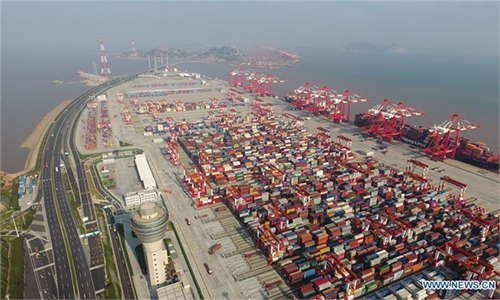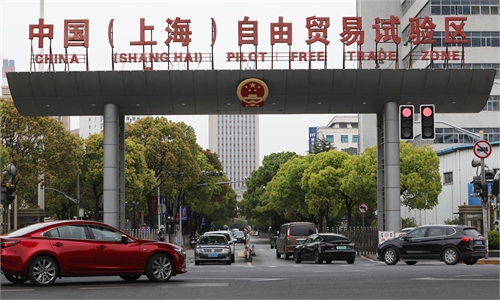China unveils plan for Shanghai Free Trade Zone; strategic blueprint emphasizes opening-up, reform of trade and investment

Shanghai Photo:VCG
The State Council, China's cabinet, recently issued a general plan for advancing institutional opening-up of China (Shanghai) Pilot Free Trade Zone (FTZ) in alignment with high-standard international economic and trade rules, unveiling details from cross-border data transfer to security management, according to a regular press conference held by the State Council Information Office on Friday, providing a comprehensive explanation and a specific implementation outline for the general plan.
The general plan serves as another positive message demonstrating the determination of both the central and local governments to expand opening-up, and will further facilitate investment and trade, experts said. It also provides policy support for enterprises actively participating in the development of Shanghai.
Marking the 10th anniversary of the establishment of the Shanghai FTZ, the introduction of the general plan further refines the development blueprint for the Shanghai FTZ.
The government's work focuses on seven aspects, presenting 80 specific measures, actively and comprehensively aligning with high-standard rules, Tang Wenhong, assistant minister of commerce, said at the regular press conference on Friday.
The plan involves deepening reforms in key areas such as domestic and foreign trade, finance and technology in advancing high-level institutional opening-up.
Specifically, the seven key areas are: accelerating the opening-up of service trade, enhancing the level of liberalization and facilitation in goods trade, taking the lead in implementing high-standard digital trade rules, strengthening intellectual property protection, advancing reforms in the government procurement sector, promoting the reform of relevant post-border management systems, and reinforcing the construction of a risk prevention and control system, as noted during the press conference.
In the next phase, the Ministry of Commerce, in collaboration with Shanghai and relevant government departments, will expedite the implementation of pilot measures, swiftly unleashing the dividends of reform and opening-up, Tang said.
This aims to generate pilot experiences that can be replicated and promoted, explore new paths and accumulate fresh insights in the comprehensive deepening of reforms and expansion of openness, the assistant minister said.
Shanghai will further enhance the systematic reform and opening-up, the deputy mayor of Shanghai Hua Yuan said at the press conference.
That includes encouraging financial institutions and payment service providers to take the lead in adopting international advanced standards for electronic payment systems as well as implementing measures such as cross-border authentication and electronic identification of digital identity, Hua said.
Shanghai FTZ has achieved notable progress over the past decade. Among the 255 top companies in Shanghai, 117 companies are registered in the FTZ, Huang Feng, head of Shanghai Foreign Investment Association, told Shanghai-based media outlet Wenhui Daily in September. The total operating income of enterprises in the FTZ exceeded 2 trillion yuan ($280 billion), accounting for 58.48 percent of the total business revenue of the top 255 enterprises.
The policies and support provided in the 10 years for the Shanghai FTZ have gradually been implemented with significant progress, while the experience gained from it is also being adopted nationwide, Xi Junyang, a professor at the Shanghai University of Finance and Economics, told the Global Times on Friday.
The Chinese expert said that at this stage, if openness isn't further expanded, the continuous effectiveness in the development of the FTZ will be limited, noting that "the general plan comes just in time, since it sets the direction and injects momentum for the future development of the FTZ."
The overall plan reflects the determination of both central and local governments to broaden opening-up measures, ensuring policy support for businesses while encouraging their increased involvement in Shanghai's development, Xi said.
The general plan signifies a greater degree of openness in China, providing institutional guarantees for companies as well as offering reassurance to foreign partners further taking part in China's economic development, Bai Ming, researcher of the Chinese Academy of International Trade and Economic Cooperation, told the Global Times on Friday.
A highlight of this FTZ plan is the advancement of reforms in the local government procurement sector, Bai said, noting that "after these reforms, more enterprises, including private and foreign ones, may have more practical opportunities to participate in various government projects, fostering a more equitable investment environment."
Gu Jie, founder and CEO of Fourier Intelligence, a tech start-up based in the Shanghai FTZ, is one of the zone's active participants. Gu told the Global Times that the company will continue to make efforts to further improve the construction of the industry ecosystem, driving the localization of the upstream and downstream industrial chains, and forming an innovative ecosystem for domestically-produced general-purpose robots.
The company specializes in rehabilitation robotics and artificial intelligence. Gu noted that they deeply understand that technology is an important pillar for national strength. "We will grasp the direction of innovation and development in the field of humanoid robots, promoting technological breakthroughs and improve the industrial chain," Gu said.



